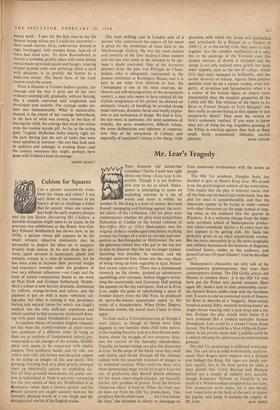Mr. Lear's Tragedy
THAT tiresome old saloon-bar comedian Charles Lamb was right about one thing—King Lear is un- actable. Though it is not fashion- able now to say so aloud. Shake- speare is attempting to snare an exploding universe in a net of words and moor it within his wooden 0. His King is a kind of maniac Bertrand Russell rampaging and frothing against the suici- dal idiocy of his civilisation. (All his plays were contemporary whether the plots were looted from Holinshed or Cinthio or the bound volumes of Box-Office Hits of 1534.) Shakespeare was the original choleric middle-aged malcontent skulking around the fringes of a court as corrupt and com- petitive as Berchtesgaden or Hollywood. He was the grammar-school boy who got to the top just in time to discover that the top no longer existed. Anything was possible, he realised, and the thought unnerved him. Gone was the cosy chain of being rising up from vegetable to God. Nature had turned topsy-turvy. There was a homosexual monarch on the throne, jumped-up adventurers squabbling over coronets, lawless beggars terror- ising the countryside, and Tammany Hall putting the squeeze on the city merchants. And so in King Lear, under the guise of refurbishing a piece of frontier history from the Old West, he produced an up-to-the-minute apocalyptic opera to the music of a thunderstorm. When Order, Degree, Decorum vanish, the moral runs, Chaos is come again.
To treat such a Glitterdammerung as though it were Ghosts, as though its theme were what happens to two families when child rules parent, is like reading Paradise Lost as a boardroom melo- drama about the struggle of two company direc- tors for control of the heavenly shareholders. Visually, no human beings can play the characters in Lear. In the surge of the blank verse they swell and stretch and shrink through all the primary colours with the unearthly freedom of images in an animated cartoon. What could be done on a three-dimensional stage would be to give Lear the sort of production that Bertolt Brecht obtained for his much more simple-minded, yet basically similar, epic parables of protest. Even the famous 'alienation effect' is built-in. When the Fool says (in lines cut from the Old Vic production), 'This prophecy Merlin shall make . . . for I live before his time,' the intention is clearly to disengage us
from emotional involvement with the actors as people.
The Old Vic producer, Douglas Seale, has decided to give us Ibsen's King Lear. His accent is on the psychological realism of the motivation. This means that the play is (almost) uncut, that all the lines can be heard and understood, that the plot for once is comprehensible, and that the characters appear to be trying to make contact with other characters on the stage instead of sing- ing away at the audience like the quartet in Rigoletto. It is a welcome change from the false- nose, acrobatic school of Shakespearian produc- tion where somebody throws a fit every time the text appears to be getting dull. Mr. Seale has probably given us an ideal school-book version. But the more reasonable he is, the more laughable and unlikely becomes all the business of disguises, confused letters, asides to the audience, and general torture ('0 poor Gloster! Lost he his other eye?').
Shakespeare's characters not only talk of his contemporary preoccupations, they wear their contemporary clothes. The Old Globe always did Hamlet in modern dress : it is the Old Vic who have put the Prince into period costume. Here again Mr. Seale's men in their presumably accur- ate Ancient Briton outfits clash with the Jacobean text. It seems to add an unwanted touch of lonesco for Kent to describe as a 'beggarly, three-suited, hundred-pound, filthy, worsted-stocking knave' an Anglo-Saxon wearing only a jock-strap and a fur boa. Perhaps the play would work better if it were produced like a modern surrealist fantasy throughout. Lear could be a crazed Citizen Kane tycoon. The Fool could be a Max-Millerish Enter- tainer in his private music-hall. Cordelia could be a radical refusing the inheritance on conscientious grounds.
The Old Vic production is solid and workman- like. The cast turn in solid workmanlike perform- ances. Paul Rogers never suggests that a divinity ever hedged this King. His rages are simply sur- face squalls, but in his final pathos he sinks a deep plumb line. Coral Browne and Barbara Jefford are a couple of suitably sexy succubi, though Rosemary Webster as Cordelia is too much of a Wordsworthian simpleton for my taste. This production never bores, but it also hardly ever raises hairs on the back of the neck or makes the jugular vein jump. It remains the tragedy of


































 Previous page
Previous page